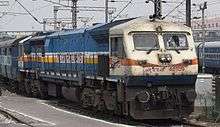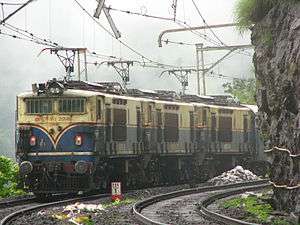Indian locomotive class WAP-4
The WAP-4 (Wide gauge, AC traction, Passenger service, 4th in series) is a class of passenger hauling electric locomotive used in Indian Railways.
| WAP-4 | |||||||||||||||||||||||||||||||||||||
|---|---|---|---|---|---|---|---|---|---|---|---|---|---|---|---|---|---|---|---|---|---|---|---|---|---|---|---|---|---|---|---|---|---|---|---|---|---|
A WAP-4 hauls the Swarna Jayanti Express. | |||||||||||||||||||||||||||||||||||||
| |||||||||||||||||||||||||||||||||||||
| |||||||||||||||||||||||||||||||||||||
| |||||||||||||||||||||||||||||||||||||
| |||||||||||||||||||||||||||||||||||||
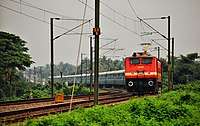
The locomotive was developed after its predecessor, the WAP-1, was found inadequate to haul the longer, heavier express trains (24-26 coaches) that were becoming the mainstay of the Indian Railways network. It was introduced in 1994, with a similar body-shell to the WAP-1 class, but with Hitachi traction motors. The electrical systems are traditional direct-current loco type tap changers, driving six traction motors arranged in Co-Co fashion. The locomotive has proved to be highly successful, with more than 750 units in service. Newer examples have been fitted with microprocessor-controlled diagnostics, static converter units (instead of arnos) and roof-mounted dynamic (rheostatic) brakes. The locomotive can be seen in service across the entire electrified network of Indian Railways and is homed at 14 locomotive sheds.
Production of this class was halted in December 2015 with locomotive number 25051 being the last unit to be rolled out of Chittaranjan Locomotive Works.
Design
The loco has a streamlined twin cab carbody design, with twin beam, top-mounted headlamps. The first 150 or so units had the headlamp mounted at waist level, with the lights being mounted in a protruding nacelle. Some earlier locos, especially from the Erode loco shed have the headlamps placed on the top. Later on the headlamps were placed in a recessed nacelle, and from road #22579 onward, the headlamps were moved to the top.
The loco is equipped with digital notch repeaters. Newer locos also feature larger windshields, more spacious driver cabin with bucket seats and ergonomic controls. The control panel has a mix of digital and analog displays in newer units while the older units were mostly analog.
Original units weighed 120 tonnes, which was later brought down to 112 tonnes through the usage of lighter material.
Some of the WAP-1 and WAP-3 and all the WAP-6 units were rebuilt to WAP-4 specifications after replacing the bogies & electricals.
It has different underframe for handling larger buffing loads. Some units are fitted with speed recorders and some changes to control electronics. Some units also have data recorders for energy consumption. Some are even fitted with windshield washers and rearview mirrors. Few were provided with signalling lamps which were subsequently removed.
Technical variants include WAP-4E which are probably fitted with electronic sensors for sensing pipe pressure loss.
The Hitachi traction motors are the ones used on freight engines. It was a challenge to put these in a passenger engine due to weight constraints. So the transformer is aluminum foil-wound and aluminum chequered plates are used for reducing the weight.
415 volts, three-phase, 50 Hz power supply is used to drive various auxiliary motors like (1) Traction motor blowers (2) Transformer radiater blower (3) Transformer oil pump (4) Smoothing Reactor Blowers (5) Silicon Rectifier Blowers (6) Battery charger. The three-phase, 415 volt supply is obtained from the single phase supply by Arno converter or static converter.
Indian railways has installed microprocessor based fault diagnostic system and Vigilance Control Device for the enhancement of safety and reliability of electric Locomotives. Some of the newly manufactured WAP-4 locomotives also have air conditioning system for the loco pilot.
Performance
If the average weight of ICF coach is 55 tonnes then it can haul the following capacity in tonnes:
| Gradient | Start | 20 km/h | 40 km/h | 60 km/h | 70 km/h | 80 km/h | 90 km/h | 100 km/h | 110 km/h | 120 km/h | 130 km/h | 140 km/h | 150 km/h | 160 km/h |
|---|---|---|---|---|---|---|---|---|---|---|---|---|---|---|
| Level | 1500+ | 1500+ | 1500+ | 1500+ | 1500+ | 1500+ | 1500+ | 1500+ | 1500+ | 1500+ | 1500+ | 1155 | 805 | 570 |
| 1 in 500 | 1500+ | 1500+ | 1500+ | 1500+ | 1500+ | 1500+ | 1500+ | 1500+ | 1500+ | 1500+ | 1105 | 805 | 565 | 400 |
| 1 in 200 | 1500+ | 1500+ | 1500+ | 1500+ | 1500+ | 1500+ | 1500+ | 1320 | 1230 | 1035 | 730 | 535 | 375 | 260 |
| 1 in 150 | 1500+ | 1500+ | 1500+ | 1500+ | 1500+ | 1500+ | 1405 | 1090 | 1020 | 860 | 610 | 445 | 310 | 215 |
| 1 in 100 | 1500+ | 1570 | 1490 | 1405 | 1365 | 1195 | 1020 | 795 | 750 | 635 | 445 | 320 | 220 | 145 |
| 1 in 50 | 1160 | 770 | 750 | 720 | 710 | 625 | 530 | 410 | 390 | 325 | 220 | 150 | 90 | 45 |
Technical specifications
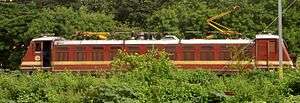
| Gear Ratio | 58:23 (One loco, #22559, was said to have a 59:23) |
| Transformer | 5400 kVA, 32 taps |
| Transformer cooling | Forced oil with Forced Air |
| Transformer Insulation | A |
| Pantographs | Two Stone India (Calcutta) AM-12. |
| Rectifiers | Two silicon rectifiers |
| Rectifier Cooling | Forced air |
| Current Ratings | 1300 A for 2 min, 1100 A for 10 min, 960 A for 60 min, 900 A continuous |
| Drive arrangement | Gear pinion |
| Number of sandboxes | 4 |
| 2 headlights | 90 W, 24 V |
| Lead acid battery | 10 Batteries each of 11 V, 75 Ah Capacity. |
| Arno Converter | 1420 rpm |
| 2 Elgi Compressors | 1000 l/minute at 7.5 kg/cm2. |
| 2 compressor motors | 3 phase 12.5 hp and 380 V |
| 2 SF India Ltd. Traction motor blowers | MLBR-42.5-144 type |
| 2 Siemens Traction motor blower motors | 22 kW, 415 V, 50 A and 2820 rpm |
| 2 SF India Ltd. Smoothing Reactor Blower | PFTA-50, ARR6 type |
| Traction Motor Suspension | Axle-hung, nose suspended |
| Traction motor weight | 3650 kg |
| Armature temperature rise | 90 °C |
| Field temperature rise | 70 °C |
| Commutator temperature rise | 85 °C |
| Armature coil resistance at 110 °C | 0.0126 ohms |
| Field coil resistance at 110 °C | 0.0117 ohms |
| Commutator coil resistance at 110 °C | 0.089 ohms |
| Traction motor continuous rating | 675 kW (905 hp), 750 V, 900 A and 895 rpm |
| Traction motor 1 hour rating | 1030 hp, 750 V and 877 rpm |
| Traction Motor air gap main place | 6.35 mm |
| Traction motor air gap inter-pole | 10 mm |
| Traction motor | 6 P |
| 2 SF India Ltd. silicon rectifier blower | 3100–3200 m/hr |
| 2 Rectifier blower motor | 22 kW, 415 V, 8 A, 2860 rpm and 60 kg(approx) |
| Oil cooler blower motor | 30 hp, 380 V, 43 A and 1450 rpm |
| BEST and Co. Pvt. Ltd. Transformer Oil Pump | 750 l/minute |
| Oil pump motor | 3.3 kW, 415 V, 6.6 A and 2865 rpm |
| SL-30 type smoothing reactor | 1250 V and 1350 A. |
| Smoothing reactor resistance at 110 °C | 0.00718 ohms |
| Notches | 32 |
Image Gallery
_Coal_Field_Express.jpg) Indian Locomotive WAP-4 Erode
Indian Locomotive WAP-4 Erode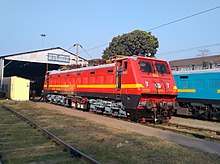 22530, off POH+RC+RP @ KPA, 16-02-2019
22530, off POH+RC+RP @ KPA, 16-02-2019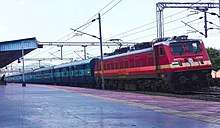 ELS Arakkonam Jn.
ELS Arakkonam Jn.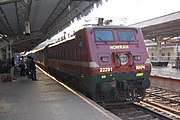 WAP4-22291Howrah
WAP4-22291Howrah
Locomotive sheds
| Zone | Name | Shed Code | Quantity |
|---|---|---|---|
| Central Railway | Bhusawal | BSL | 43 |
| Eastern Railway | Asansol | ASN | 18 |
| Howrah | HWH | 73 | |
| East Central Railway | Pt. DD Upadhyaya Junction | DDU | 92 |
| East Coast Railway | Visakhapatnam | VSKP | 21 |
| Northern Railway | Tughlakabad | TKD(D) | 29 |
| North Central Railway | Jhansi | JHS | 18 |
| Kanpur | CNB | 30 | |
| North Eastern Railway | Gonda | GD(D) | 13 |
| Southern Railway | Arakkonam | AJJ | 77 |
| Erode | ED | 74 | |
| South Central Railway | Vijayawada | BZA | 68 |
| South Eastern Railway | Santragachi | SRC | 70 |
| Western Railway | Vadodara | BRC | 47 |
| Valsad | BL | 25 | |
| West Central Railway | Itarsi | ET | 75 |
| Total Locomotives Active as of 01-06-2020[2] | 773 | ||
See also
References
Notes
- "Indian AC electric loco information". Irfca.org. Retrieved 3 April 2013.
- "e-Locos".
Bibliography
- Hughes, Hugh (1996). Indian Locomotives: Part 4 – 1941–1990. Harrow, Middlesex: The Continental Railway Circle. ISBN 0-9521655-1-1.
| Wikimedia Commons has media related to Indian locomotive class WAP4. |

